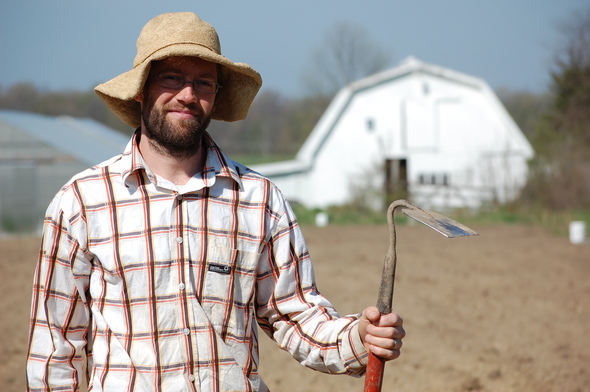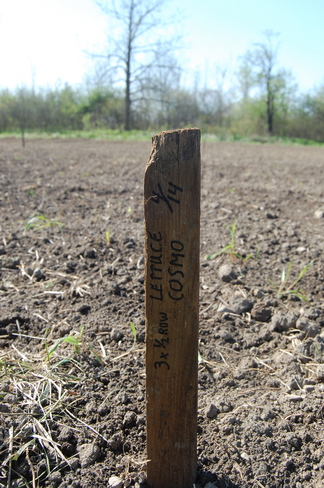Former computer engineer Eric Kampe sprouts Ann Arbor Seed Co.

Ann Arbor Seed Co. founder Eric Kampe rented three-quarters of an acre of land off of Tessmer Road west of Ann Arbor to grow a wide range of organic crops, which he will harvest for seed, process, package and sell for next year's growing season.
Janet Miller | For AnnArbor.com
Five miles west of downtown Ann Arbor, off a dirt road where the city turns into countryside, Eric Kampe is sprouting a new business.
Between day jobs, one as a driver for Eat Local/Eat Natural, which delivers local food to restaurants, the former computer engineer is plowing and hoeing and planting organic vegetables that a year from now will be Ann Arbor Seed Co. It is Ann Arbor’s first - at least in recent history - seed company, and will add another piece to the growing local food movement jigsaw.
Kampe is leasing a three-quarter acre plot of land off of Tessmer Road. “I can’t decide if it’s a small farm or a big garden,” he said. “I can’t make up my mind if this is huge, or tiny.” He began planting two weeks ago.
He came to farming by way of computer engineering, where he worked for three years in Michigan and two years in Boulder, Colo. “Boulder is where I found farming,” said Kampe, a Michigan native and a University of Michigan graduate. “I’ve always been a strong environmentalist and I wasn’t unhappy with engineering. But that’s not where I wanted to stay.”

Crop rows are marked off. Kampe, who worked as a computer engineer until he switched to farming five years ago, began planting two weeks ago. While he plans on growing a wide range of crops, he will focus on lettuces and tomatoes.
Janet Miller | For Ann Arbor.com
He was drawn to the process of producing seed. “It’s a beautiful completion of the process,” he said. “I was young and got caught up in the wonder of it.” He also found that he needed to use the same kind of problem-solving skills he developed as an engineer.
Most seed crops must mature completely - beyond the time when they are tastiest - in order to harvest seed. “It’s a longer run, but it’s not dramatically different from growing vegetables. It’s just a different end product,” Kampe said.
There are things to consider, however, such as cross-pollination. Because his field is relatively small, he’s limited on some crops to growing a single variety because of cross-pollination.
For his first year, Kampe focused on lettuce and tomatoes because they are in high demand and because they don’t cross-pollinate. But he’s also adding sweet peas, spinach, Asian greens, cabbage, cucumbers, squash and more. He’ll harvest the seeds at the end of the season and clean, screen bag and tag them over the fall and winter.
Kampe plans to sell Ann Arbor Seed Co. packets at the Ann Arbor Farmers Market and at as many area retail locations that are interested. After a couple of growing seasons, the seeds will make gentle adaptations to Ann Arbor climate and soil, making them truly local, Kampe said. Ann Arbor Seed Co. seeds will make the local food movement local from the start.
Kampe said it’s impossible to predict how much seed he will have at the end of his first season. “It’s really variable. There can be good years for lettuce and bad years for eggplant. That is amplified in the seed world,” he said.
He wants to keep his business local, he said. “I’m not big enough to go regional, and that’s not part of the plan. I want it to be local. I’m not looking to be a supplier to the big guys.”
But that doesn’t mean he doesn’t have bigger plans.
He wants Ann Arbor Seed Co. to be a catalyst for seed saving, encouraging local gardeners and farmers to produce their own seed, and bringing people together to learn and discuss seeds. It’s not competition in the same way hobby gardeners are not competition for farmers markets, Kampe said. Gardeners and farmers who save their own seed learn to appreciate its merits and will turn to Ann Arbor Seed Co. for the vegetable seeds they don’t have, he said. “People who grow gardens become the biggest food advocates.”


Comments
E. Daniel Ayres
Thu, Apr 26, 2012 : 2:02 p.m.
Seed farming, as Erik probably knows from his research, is a lifetime commitment. 3/4 acre is a tiny start. Ken Asmus who runs Oikos Tree Crops near Kalamazoo only has ten acres, but you wouldn't know that from his catalog because he also sources some items from other growers. Erik would do well to develop and maintain the conversation with "seed savers" in the county. It would provide them with a market for the variety of things being perpetuated in backyards and local farms as well as what he can produce himself. A computer engineering background is critical to the success of that kind of collaboration.
sellers
Mon, Apr 23, 2012 : 5:51 p.m.
I'm curious to know how the cross pollination via bees with GMO crops in neighboring fields will impact the process.
Greg M
Mon, Apr 23, 2012 : 3 p.m.
I forsee some (can't resist) cross-pollinating opportunities with area beekeepers!
Mona
Mon, Apr 23, 2012 : 2:39 p.m.
Saline has an "indoor farmers market" all winter that is new this year, Saturday mornings. February and March are prime seed selling months. I've been gardening in Saline for 20 years and look forward to your organic seeds! Good luck to you. FYI, I'm a former Chemical Engineer, now dietitian.
OLDTIMER3
Mon, Apr 23, 2012 : 1:38 p.m.
Wasn't there a VITALITY SEEDS company that was located in the AA area years ago? The FFA used to sell them before 1965.
Thomas
Mon, Apr 23, 2012 : 12:40 p.m.
Might I suggest selling at one or both of the Ypsilanti Farmer's Markets as well?
DonBee
Mon, Apr 23, 2012 : 11:06 a.m.
I wish Mr Kampe well. Growing seed is difficult business. Finding space to grow seed where cross pollination does not happen is also difficult. I hope he is successful in getting this up and running. It is about as different a job from computer programmer can get.
Stuart Brown
Mon, Apr 23, 2012 : 1 a.m.
Eric, Have you given any thought on how to deal with Monsanto if they decide to sue you for patent infringement due to cross pollination deriving from GM seeds supplied by Monsanto? I saw a documentary on this showing one farmer's hopeless fight to save his seed business from a predatory lawsuit filed by Monsanto; scary stuff!
ypsicat
Mon, Apr 23, 2012 : 12:32 a.m.
Re: the photo -- a much more genial American Gothic.
Eric Kampe
Sun, Apr 22, 2012 : 10:06 p.m.
Thanks for the article Janet! I had a nice time chatting with you.
djacks24
Sun, Apr 22, 2012 : 9:32 p.m.
"Between day jobs, one as a driver for Eat Local/Eat Natural, which delivers local food to restaurants, the former computer engineer is plowing and hoeing and planting organic vegetables that a year from now will be Ann Arbor Seed Co." Something about being a Computer Engineer as a day job that doesn't fit? Too physically strenuous to be a Computer Engineer and farmer at the same time or just something for Ann Arbor.com to possibly get more "hits" while scattering for current events filler?
smokeblwr
Sun, Apr 22, 2012 : 6:34 p.m.
Most people I knew in Boulder, CO tended to also grow.....uhhhh....their own pain management medicine.
Erin Drasher
Sun, Apr 22, 2012 : 5:53 p.m.
This is AWESOME! <3 <3 <3 :)